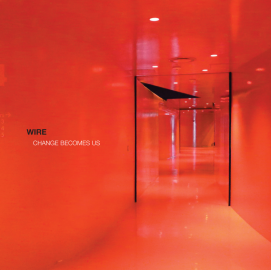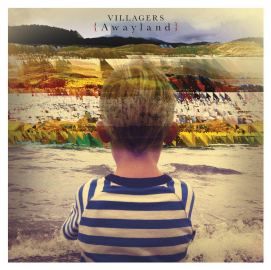Print Edition: April 10, 2013
Wire
Change Becomes Us
Punk rock, with its conventionally uncultured aesthetic, doesn’t have many bands approaching it with a very studious approach, but then again, Wire is not a traditional punk rock band. The English veterans have never really played by the rules of the now marketable genre, choosing to zig when other bands zagged and constantly reinventing themselves. Their 13th studio album Change Becomes Us fills in a bit of Wire’s scattered history, as the songs on the record were originally written for the band’s live performances during their 1979/80 tour. Longtime Wire fans will recognize some of this material from their live album Document And Eyewitness, released in 1981. Indeed, the reason Changes sounds as if it will jump out of the speakers is due to the fact that the band had originally intended to perform these songs in a live setting. Despite these songs being written over three decades ago, they still sound astonishingly contemporary, which makes sense when you look at Wire’s history of staying ahead of the curve. Changes also functions as a retrospective on the experimental changes Wire has gone through amidst countless break-ups and changes in direction.
Cheers Elephant
Like Wind Blows Fire
On the unassuming soul-pop debut record from rose-tinged Philadelphia quartet Cheers Elephant, the band manages to conjure a healthy dose of studied and understated pop hooks. Indebted to but not overwhelmed by their ‘60s pop influences, Cheers Elephant colour Like Wind Blows Fire’s 10 compact tracks with enough post-punk affect to create a highly-listenable, if slightly obvious juxtaposition. The closest contemporary touchstone is probably international super trio Little Joy’s tropical departure from drummer Fabrizio Moretti’s better-known NYC band The Strokes. Like Wind Blows Fire isn’t a challenging record, but it is a good record. And for the times when the band is firing on all cylinders, the experience is totally worth it. The album’s strongest point is “Leaves,” a kinetic and close-miked acoustic number embellished with bells and an outro electric guitar solo that nods toward ‘90s slacker rock a la Yo La Tengo or Pavement. Between the snappy drums, male / female harmony, and eclectic overdubs, listeners will also notice a lot of incidental noise cropping up as transitions between the tracks, suggesting an intrusion into Cheers Elephant’s AM dial optimism. This interference (whether German dialogue, feedback whine, traffic or nature) hints at a collection of songs best played through a cheap boombox.
Villagers
Awayland
Villager’s Awayland opens with the kind of chords and vocals that lend themselves to the dim and intimate warmth of a small setting, seated six feet away from the artist and making eye contact. This is the essence of what follows: honest, intimate and almost haunting. At the same time, the Irish indie music is energetic and meticulously rhythmic. The third song on the album, “Waves,” aptly captures the sensation of what it’s like to live in modern society: it begins with a steady and frenetic high-pitched beat, blended with the guitar and striking poetics. “Look at the girls, look at the gold / Gathered, beat and bought and sold / One man’s innocence is another’s chance / What were you thinking of?” The tracks of this album link together as though the listener has tapped into the artist’s stream of consciousness, simultaneously lyrical and jarring. This is not work-while-you-listen music; it’s too compelling and detailed.
Paramore
Paramore
Measured by music, memories segment into timeframes, song lengths, lyrics that spoke to something, now dimunitive and lacking. High-school pseudo-alt-rock is something Hayley Williams can’t have done anything but matured past, yet because of success or image constraints or perhaps a genuine affinity, eight years later, with a new, yet self-titled album suggesting origin (the first album with her as sole member remaining since inception), Paramore is still fitted with filled guitars and directionless drums – leaving Williams’ words front and centre. At over an hour, perhaps this is supposed to be more mature, aspiring surely, with interludes (of passive aggressive verbal revenge) and allusions to growing up and getting out (though it comes out on “Now” and “Daydreaming” as an unintentional alignment with the oblivious pre-fun Spring Breakers). It’s length, not room used for change or unconventionality. Paramore is memorizable riffs and detailed speak-sing that leads back to itself, at its worst, the sound of advertising space to sell platitudes (“Ain’t It Fun,” “Still Into You,” “Anklebiters”). Seven-minute closer “Future” aims at authenticity, and works as quiet coda, until it too becomes all-out Statement, because if drums are hit this hard and guitars played this loud, it must mean something important and real.






